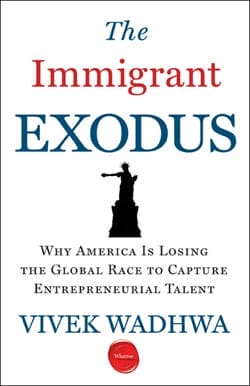Vivek Wadhwa published The Immigrant Exodus with Wharton Digital Press to address an issue that endangers America’s role as the world’s most entrepreneurial and technologically advanced nation. Wadhwa knows firsthand about his book’s topic. Founder of Relativity Technologies and former corporate technology executive, Wadhwa has risen far in his adopted homeland. He now serves as an academic at numerous prestigious institutions, writes for brandname media outlets and was named an “Outstanding American by Choice” by the U.S. government in 2012. Whereas once immigrants like Wadhwa flocked to the U.S. to launch their dream companies, his data suggests, now they are leaving and doing so elsewhere. Wharton Magazine sat down with Wadhwa to learn more.
Wharton Magazine: Why is the immigration issue so acute when it comes to entrepreneurs?
 Vivek Wadhwa: As research shows, almost all net new jobs in the economy are created by startups, and immigrants are now more than twice as likely as the native-born to start a business. In the tech sector, 52 percent of Silicon Valley startups from 1995-2005 were started by immigrants. But as our new research shows, this proportion has dropped to 43.9 percent. On average, the previous cohort of startup founders started their companies 13 years after entering the United States. Given the massive influx of skilled workers in the late 1990s and early 2000s, we expected a significant increase in immigrant-founded startups—not this decrease.
Vivek Wadhwa: As research shows, almost all net new jobs in the economy are created by startups, and immigrants are now more than twice as likely as the native-born to start a business. In the tech sector, 52 percent of Silicon Valley startups from 1995-2005 were started by immigrants. But as our new research shows, this proportion has dropped to 43.9 percent. On average, the previous cohort of startup founders started their companies 13 years after entering the United States. Given the massive influx of skilled workers in the late 1990s and early 2000s, we expected a significant increase in immigrant-founded startups—not this decrease.
WM: Still, many entrepreneurs leave their home country to grow their startup in the United States, even with the current immigration regime. Why?
VW: Because America is still the place to be, particularly if you are a tech entrepreneur. The U.S. technology industry’s entrepreneurship networks and culture provide a very fertile ground for startups. Even though the tech centers of countries like China and India are booming, Silicon Valley is still far ahead. It won’t always be like this, but for now we have a great advantage.
WM: How could the tide have shifted so dramatically–from an influx of entrepreneurs to an exodus?
VW: We have made it very difficult for skilled immigrants to get visas that allow them to become entrepreneurs, and they are seeing improving opportunities in their home countries. Previous generations of immigrants could readily get permanent-resident visas soon after they came to work in the United States. After a few years, they began to grow deep roots in their communities. They were all doing better than the friends and relatives they left behind, so it didn’t occur to them that they should return. Now, new immigrants expect to face long wait times for permanent-resident visas. They see their friends back home and those who returned doing quite well—sometimes even better than they are here. They wonder why they should put up with the humiliation and endless wait for a visa. Indians and Chinese typically have to wait more than a decade—while their careers and ambitions stall.
WM: Wouldn’t you expect the “reverse brain drain” to occur eventually anyway, with globalization and the strengthening of other economies?
VW: Yes, as other countries become industrialized and become open, inclusive and innovative like us, there will be no reason for people to leave their home countries and come to the United States. But this is decades away. By encouraging entrepreneurs to return back home now, we are hastening the rise of our global competitors and weakening our economy. If we were doing this as a way of helping the rest of the world as we do with foreign aid, that would be one thing. But we are doing this out of ignorance and complacency— we don’t even realize that there is a reverse brain drain in process. We are hemorrhaging without realizing it.

























